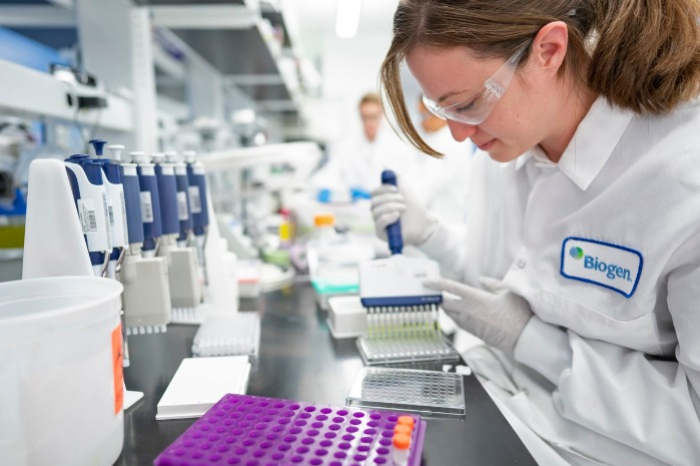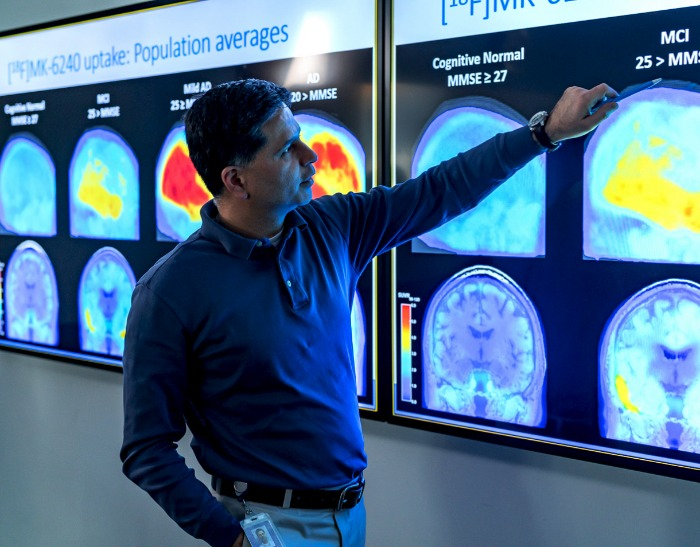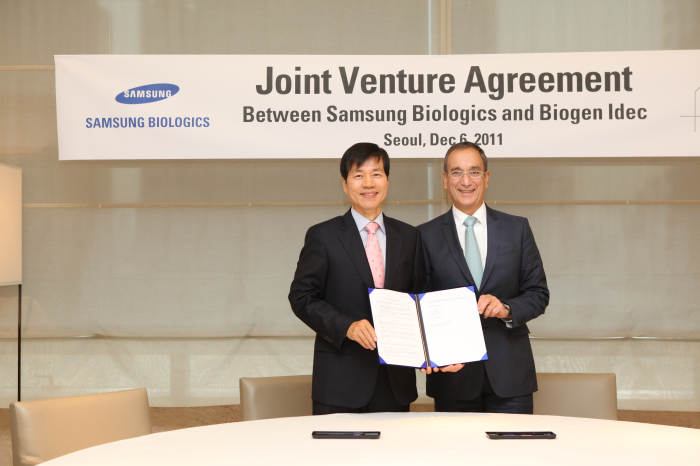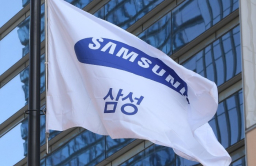-
KOSPI 2577.27 -2.21 -0.09%
-
KOSDAQ 722.52 -7.07 -0.97%
-
KOSPI200 341.49 +0.02 +0.01%
-
USD/KRW 1396 -2.00 0.14%
Samsung Group in negotiations to buy Biogen
The more-than-$40 billion acquisition would mark the largest transaction ever for the South Korean conglomerate
By
Dec 30, 2021 (Gmt+09:00)

South Korea's Samsung Group is in negotiations to buy Biogen Inc., a leading US-based drugmaker for neurological conditions such as Alzheimer's and dementia, according to investment banking sources on Wednesday.
The Nasdaq-listed biotechnology firm approached Samsung to sell its shares, which could be valued at more than 50 trillion won ($42 billion), including a control premium. Biogen's current market cap is slightly less than $35 billion.
"Samsung is at the negotiating table with the sell-side to acquire Biogen," a senior official at a global investment bank told The Korea Economic Daily on Dec. 29.
Samsung Group's major arms will likely participate in the proposed megadeal, which will mark the group's largest transaction since its $8 billion acquisition of Harman, a US electronics systems maker for automobiles, in 2016.
Further details were not immediately known.
If the top South Korean conglomerate acquires a stake in the US company, it will join the ranks of global biotechnology giants, expanding its pharmaceutical business beyond biosimilar drugs and contract manufacturing deals.
Biogen is also expected to produce high operating profits on a stable basis unlike cyclical industries like semiconductors.
PIONEER IN NEUROSCIENCE
The company is a pioneer in the field of treatments for nervous system diseases like multiple sclerosis and Parkinson's disease. It has 33 new drug candidates in the pipeline, while conducting phase 3 clinical trials on seven antidepressant candidates.

Last year, the biotech firm raked in $13.4 billion in revenue. It ranks 19th in terms of pharmaceutical product sales worldwide, roughly on a par with Boehringer Ingelheim, a German drugmaker.
However, its share price recently suffered steep declines amid the controversy over the efficacy of its new Alzheimer's treatment and its disappointing sales, leading to the resignation of its R&D chief Alfred Sandrock last month. Its share price tumbled to the lowest level in two years.
The Alzheimer's drug, Aduhelm, was jointly developed with Japan's Eisai Co. and got the nod from the US Food & Drug Administration in June of this year.
Despite becoming the first new treatment for Alzheimer's in 18 years to receive FDA approval, the drug's sales reached only 2% of its targeted $14 million in the third quarter of this year. As a result, Biogen cut the drug's price by almost half.
Moreover, the patent expiration in mid-2020 of its top-grossing medication Tecfidera for multiple sclerosis was blamed for the company's weak sales due to the release of its generic competitors.
"Biogen is desperate to make a breakthrough," an industry source said. "The acquisition deal with Samsung would be part of such efforts."
JOINT OWNERSHIP OF SAMSUNG'S BIOSIMILAR DRUG UNIT
Back in 2011, Samsung formed a partnership with Biogen for joint ownership and management of its biosimilar business. Biogen holds a 50% stake minus one share in Samsung Bioepis Co., with Samsung Biologics controlling the remaining stake.

But the joint ownership has posed a stumbling block to the biosimilar company's efforts to advance into the fields overlapping those of Biogen. Its stake purchase of Biogen will help diversify Samsung Bioepsis' product lineup, while shoring up the contract manufacturing business at Samsung Biologics.
Biogen's major shareholders include Primcecap Management with an 11.07%, Vanguard Group with a 7.54% stake, BlackRock with a 5.49% stake and State Street Global Advisors with a 4.7% stake.
SAMSUNG'S $200 BILLION SPENDING PLANS
This September, Samsung Group unveiled ambitious spending plans, saying it would invest a combined 240 trillion won ($206 billion) over the next three years in its core businesses such as semiconductors, displays and biopharmaceutical products.
"Samsung is nurturing bio business as a new growth engine. Acquiring Biogen will create an opportunity to take a quantum leap," another industry source said.
In case the negotiations with Biogen fail, Samsung will try to buy back the remaining stake held by the US company in its biosimilar joint venture Samsung Bioepis, according to the sources.
Write to Jae-young Han, Ju-hyun Lee, Hyun-Suk Kim and Hyung-suk Song at jyhan@hankyung.com
Yeonhee Kim edited this article.
-
Aug 24, 2021 (Gmt+09:00)



